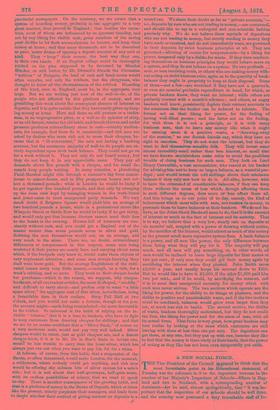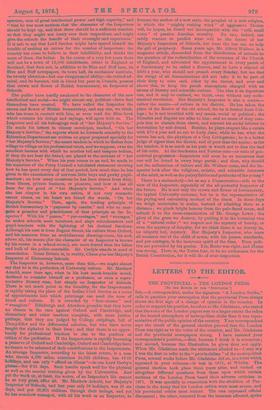A NEW SOCIAL FORCE.
TIRE Vice-President of the Council appeared to think that the
most formidable point in his Educational statement of Tuesday was the reference in it to the important increase in 'the number of her Majesty's Inspectors of Schools—fifteen in Eng- land and two in Scotland, with a corresponding number of Assistants—for he said, almost apologetically, that "it was im- portant that the inspection of our achools should be well done, and the country now possessed a very remarkable staff ad In- spectors, men of great intellectual power and high capacity," and "that he was moat anxious that the character of the Inspectors should be kept up, and that there should be a sufficient number, so that they might not hurry over their inspections, and might give the schools the benefit of their oversight and experience." It is safe to say that Lord Sandon might have spared himself the trouble of making an excuse for the number of inspectors ; the country has come to believe in their infallibility, and thinks the more of them, the better. In the course of a very few years there will not be a town of 12,000 inhabitants, either in England or Scotland, that does not, in addition to its Blue and Buff inns, its Blue and Buff newspapers, its town hall, its mechanics' institute, its twenty churches—but one clergyman of ability—its retired ad- miral, and its baronet, rich in blood but poor in Consols, possess that crown and flower of British bureaucracy, an Inspector of Schools.
The public have hardly awakened to the character of the new intellectual and social—we might almost say, political—force that themselves have created. We have called the Inspector the crown and flower of British bureaucracy, and any one, we think, who has come in contact with him, or even read the Blue-book which contains his doings and sayings, will agree with us. The Inspector and all his belongings reek of "her Majesty's Service." He sends his letters in clumsy envelopes, marked, "On her Majesty's Service ;" the reports which he forwards annually to the Education Department are written on paper prepared specially for "her Majesty's Service;" the smart tandem in which he flashes from village to village on his professional tours, and 'we suppose, even the excellent havena with which he soothes toil and tempers tedium, if they do not bear the brand, are placed to the account of "her Majesty's Service." When his year comes to an end, he sends to his superiors of the Privy Council a tabulated statement showing how he has spent every day of that period, how much time he has given to the examination of nervous little boys and gawky pupil- teachers; on how many occasions he has been absent from duty, from illness, private business, or pleasure, and how it has all been for the good of "her Majesty's Service." And when the last chapter in his own active, if not very romantic -career closes, on his heart are found the words, "On her Majesty's Service." Then, again, the leading principle of British bureaucracy is "payment by results," and who so ener- getic a preacher and practitioner of that principle as the In- spector? With his "passes," " per-centages," and "averages," be makes schools, mars monitors, and slays schoolmasters and pupil-teachers with the lightning of his decimal fractions. Although his coat is from Regent Street, his culture from Oxford, and his manners from an archidiaconal drawing-room, his nod, above all, his sneeze (for the character of an Inspector is known by his sneeze in a school-room), are more feared than the baton and bulk of the police-constable. Mr. Carlyle stands in need of -emendation. Great Britain is, in reality, Chaos plus her Majesty's Inspector of Elementary Schools.
The Inspector is, however, more than this,—we might almost say that he is the perfection of University culture. Mr. Matthew Arnold, some time ago, when in his beat mock-humble mood, declined to consider himself as a professor, or even a repre- sentative literary man, but simply an Inspector of Schools. There is not much point in the humility, for the Inspectorate is rapidly taking the place of the Indian Civil Service as a nexus of appointments into which patronage can send the sons of blood and culture. It is crowded by " first-classes " and -" wranglers." Edinburgh and Aberdeen grumble that they have no chance in the race against Oxford and Cambridge, and elementary and other teachers complain, with more justice, perhaps, that they are judged by College striplings, full of Thucydides and the differential calculus, but who have never 'taught the alphabet in their lives ; and that there is no oppor- tunity for professional teachers to rise to the position of critics of the profession. If the Inspectorate is rapidly becoming a preserve of Oxford and Cambridge, Oxford and Cambridge have no reason to be ashamed of their contributions to the Inspectorate. An average Inspector, according to the latest return, is a man -who travels 4,290 miles, examines 24,625 children, has 44-59 holidays, and can only "afford an illness "—to use Lord Derby's phrase—for 3-21 days. Such results speak well for the physical as well as the mental training given by the Universities. And yet the work or, at least, the worry, of an Inspector's life cannot be so very great, after all. Mr. Matthew Arnold, her Majesty's Inspector of Sc'hools, had last year only 39 holidays, was ill six days, and put 26,821 children through their facings, and yet he has somehow managed, with all his work as an Inspector, to become the author of a new style, the prophet of a new religion, in which the "mighty rushing wind" of aggressive Theism will, he hopes, be found not incompatible with the "still, small voice" of passive Aurelian morality. No one, indeed, can safely venture to predict what will be the future of her Majesty's Inspectors of Schools, but none the less can we help the gift of prophecy. Some years ago, Mr. Alfred Wallace, in a magazine article, descended from the distribution of animals to the question of the redistribution of the revenues of the Church of England, and advocated the appointment in every parish of a functionary to be called a Rector, and to have a stipend of £600 a year, who should not preach every Sunday, but see that the clergy of all denominations did not take it to be part of their duty to seize each other by the throat, and over and above this, to keep the parish atmosphere charged with an aroma of literary and scientific culture. The idea is an ingenious one, and it may be realised, we think, even without any eccle- siastical revolution. Her Majesty's Inspector is also a centre— rather the centre—of culture in his district. He has taken the place of the Rector of the old school, for he is fresher from Col- lege; he is not troubled with any mania, social or political ; the Ritualist and Baptist are alike to him; and no sense of duty com- pels him to abstain from claret, and convert his social inferior to teetotalism by self-deniaL Besides, he plays croquet like a curate with £70 a year and an eye to Lady Jane, while he has, what the curate has not, the physique of a Guy Livingstone ; he is a better judge of cigars than the doctor, and of port than the squire; as for the teacher, it is as much as his post is worth not to kiss the feet of his critic. At the Sandonian and Forster rate—or ratio of geo- metrical progression—Inspectors will soon be so numerous that one will be found in every large parish ; and then, why should not the millennium of culture and Mr. Wallace come, and the In- spector look after the religious, artistic, and scientific interests of the adult, as well as the polysyllables and pothooks of the young?
There is a melancholy—let us say a Conservative—side to the view of the Inspector, especially of the all-powerful Inspector of the future. He is not only the crown and flower of bureaucracy, the typical University outcome, but he is the representative of the prying and calculating method of the times. In these days we weigh mountains in scales, instead of admiring them at a distance ; we pluck bright honour from the pale-faced moon, and submit it to the cross-examination of Mr. George Lewis ; the glory of the grass we destroy, by putting it in the botanical vice of a "natural order ;" we respect not the mystery of beauty, or even the mystery of iniquity, for we think there is no beauty in, no iniquity but, mystery. Her Majesty's Inspector, who tears all romance out of the child of seven, with his passes, standards, and per-centages, is the incarnate spirit of the time. Even poli- tics are pervaded by his genius. Yes, Burke was right, and Hume was wrong. There is, the Tories fear, to be no euthanasia for the British Constitution, for it will die of over-inspection.































 Previous page
Previous page